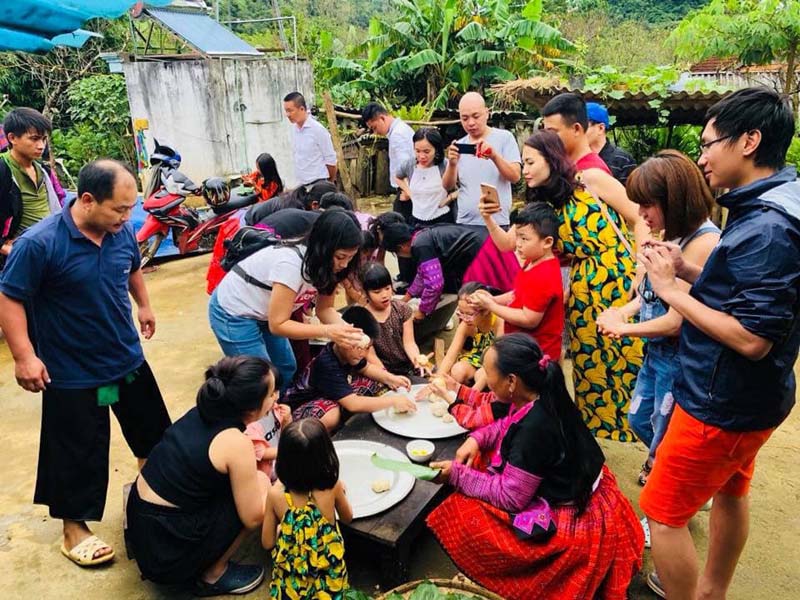



The visitors are experiencing the processes of making Day cakes of the Mong ethnic people in Hang Kia commune (Mai Chau).
Day cake is an indispensable traditional dish in Tet tray of Mong ethnic people. Mong ethnic people in Mai Chau only make Day cakes on the occasion of Tet and other festivals. For Mong ethnic people, Day cake symbolizes love and fidelity of the couple, and it also symbolizes the moon and the sun - the source for the existence of all things.
The flavor and fragrant Day cakes are made from the upland sticky rice, but the stages to make the cake is meticulous. The sticky rice used to make cakes is carefully selected. It must be the upland sticky rice, which is both fragrant and flexible to ensure the quality of cakes. The sticky rice is washed away and soaked in warm water for about 12 - 24 hours. Then it is taken out, drained and then put on Cho (a kind of cooking pot). It must be boiled in about 1-2 hours so the sticky rice is soft, flexible but not crushed. After being well-done, when the sticky rice is still hot, it must be taken away immediately to pound to make it soft and smooth, and when making the cakes it is still soft.
Pounding Day cakes is the most difficult stage. The mortar and the pestle should be made from large, hard, fragrant woody stems. The mortar is hollowed out inside, the pestle must be heavy to pound the cake. This is the stage that requires the participation of the healthy men. The technology, the experience, and the strength of the hands that work together non-stop make Day cakes soft and plastic.
Pounding the cake lasts in about 1-2 hours, the longer you pound, the softer, more plastic and more delicious Day cakes are, and they can be kept longer. After the cake is pounded, the skillful hands of Mong women are required. They use their hands rubbed with the egg yolks to mold the pounded sticky rice into the round and flat cakes. After molded, the cakes are put on the surface of the grill, so that the cake does not stick, they have to flip quickly and continuously. Finally, it is the process of wrapping the cake into fresh banana leaves that have been washed, dried, cut properly and heated through fire so that the leaves are soft and aromatic.
Mong ethnic people do not have any filling in Day cakes, and they do not use any kind of spice, so the cakes retain the natural sweet and the fragrant taste of the upland sticky rice. The cakes can be used when they are hot, they can be kept for about 1 month, too. They can be cut into pieces to fry or grill over the charcoal. They are really mouthwatering.
Currently, visitors to Mai Chau are also involved in the stages to make Day cakes, from pounding to molding and finally enjoying the delicious cakes made by their own hands. Day cakes are not only a specialty of Mong ethnic people, the custom of making Day cakes on Tet holiday also contributes to preserving, conserving and promoting the traditional cultural values of the nation.